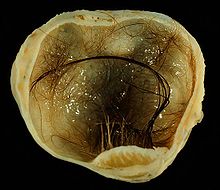User:Mr. Ibrahem/Teratoma
| Teratoma | |
|---|---|
 | |
| A small (4 cm) dermoid cyst of an ovary, discovered during Cesarean section | |
| Specialty | Gynecology, oncology |
| Symptoms | Minimal, painless lump[1][2] |
| Complications | Ovarian torsion, testicular torsion, hydrops fetalis[1][2][3] |
| Types | Mature, immature[4] |
| Causes | Unknown[2] |
| Diagnostic method | Tissue biopsy[2] |
| Differential diagnosis | Lipoma, dermoid, myelomeningocele[5] |
| Treatment | Surgery, chemotherapy[5][6] |
| Frequency | 1 in 30,000 newborns (tailbone)[7] |
A teratoma is a tumor made up of several different types of tissue, such as hair, muscle, teeth, or bone.[4] They typically form in the ovary, testicle, or tailbone and less commonly in other areas.[4] Symptoms may be minimal if the tumor is small.[2] A testicular teratoma may present as a painless lump.[1] Complications may include ovarian torsion, testicular torsion, or hydrops fetalis.[1][2][3]
They are a type of germ cell tumor (a tumor that begins in the cells that give rise to sperm or eggs).[4][8] They are divided into two types: mature and immature.[4] Mature teratomas include dermoid cysts and are generally benign.[8] Immature teratomas may be cancerous.[4][9] Most ovarian teratomas are mature.[10] In adults, testicular teratomas are generally cancerous.[11] Definitive diagnosis is based on a tissue biopsy.[2]
Treatment of tailbone, testicular, and ovarian teratomas is generally by surgery.[5][6][12] Testicular and immature ovarian teratomas are also frequently treated with chemotherapy.[6][10]
Teratomas occur in the coccyx in about one in 30,000 newborns, making them one of the most common tumors in this age group.[5][7] Females are affected more often than males.[5] Ovarian teratomas represent about a quarter of ovarian tumors and are typically noticed during middle age.[10] Testicular teratomas represent almost half of testicular cancers.[13] They can occur in both children and adults.[14] The term comes from the Greek words for "monster" and "tumor".[15]
References[edit]
- ^ a b c d Raja, Shahzad G. (2007). Access to Surgery: 500 single best answer questions in general and systematic pathology. PasTest Ltd. p. 508. ISBN 9781905635368. Archived from the original on 2020-07-30. Retrieved 2020-06-26.
- ^ a b c d e f g "Sacrococcygeal Teratoma". NORD (National Organization for Rare Disorders). 2007. Archived from the original on 19 February 2017. Retrieved 20 December 2017.
- ^ a b Saba, Luca; Acharya, U. Rajendra; Guerriero, Stefano; Suri, Jasjit S. (2014). Ovarian Neoplasm Imaging. Springer Science & Business Media. p. 165. ISBN 9781461486336. Archived from the original on 2020-09-20. Retrieved 2020-06-26.
- ^ a b c d e f "NCI Dictionary of Cancer Terms". National Cancer Institute. 2011-02-02. Archived from the original on 2018-01-23. Retrieved 20 December 2017.
- ^ a b c d e Davies, Mark; Inglis, Garry; Jardine, Luke; Koorts, Pieter (2012). Antenatal Consults: A Guide for Neonatologists and Paediatricians - E-Book. Elsevier Health Sciences. p. 298. ISBN 978-0729581080. Archived from the original on 2020-08-05. Retrieved 2020-06-26.
- ^ a b c Price, Pat; Sikora, Karol; Illidge, Tim (2008). Treatment of Cancer Fifth Edition. CRC Press. p. 713. ISBN 9780340912218. Archived from the original on 2021-08-29. Retrieved 2020-06-26.
- ^ a b Corton, Marlene M; Leveno, Kenneth J; Bloom, Steven L; Hoffman, Barbara L (2014). Williams Obstetrics 24/E (EBOOK). McGraw Hill Professional. p. Chapter 16. ISBN 9780071798945. Archived from the original on 2020-07-30. Retrieved 2020-06-26.
- ^ a b "Mature teratoma". National Cancer Institute. 2011-02-02. Archived from the original on 2018-01-23. Retrieved 20 December 2017.
- ^ Noor, Mohd Rushdan Md; Hseon, Tay Eng; Jeffrey, Low Jen Hui (2014). Gynaecologic Cancer: A Handbook for Students and Practitioners. CRC Press. p. 446. ISBN 9789814463065. Archived from the original on 2020-08-03. Retrieved 2020-06-26.
- ^ a b c Falcone, Tommaso; Hurd, William W. (2007). Clinical Reproductive Medicine and Surgery. Elsevier Health Sciences. p. 749. ISBN 978-0323033091. Archived from the original on 2020-07-04. Retrieved 2020-06-26.
- ^ Oyasu, Ryoichi; Yang, Ximing J; Yoshida, Osamu (2009). Questions in Daily Urologic Practice: Updates for Urologists and Diagnostic Pathologists. Springer Science & Business Media. p. 253. ISBN 9784431728191. Archived from the original on 2020-09-22. Retrieved 2020-06-26.
- ^ Hillard, Paula J Adams; Hillard, Paula Adams (2008). The 5-minute Obstetrics and Gynecology Consult. Lippincott Williams & Wilkins. p. 140. ISBN 9780781769426. Archived from the original on 2020-08-03. Retrieved 2020-06-26.
- ^ Hart, I; Newton, RW (2012). Endocrinology. Springer Science & Business Media. p. 157. ISBN 9789401092982. Archived from the original on 2020-07-06. Retrieved 2020-06-26.
- ^ McDougal, W Scott; Wein, Alan J; Kavoussi, Louis R; Novick, Andrew C; Partin, Alan W; Peters, Craig A.; Ramchandani, Parvati (2011). Campbell-Walsh Urology 10th Edition Review E-Book. Elsevier Health Sciences. p. 663. ISBN 978-1455723171. Archived from the original on 2020-08-05. Retrieved 2020-06-26.
- ^ Chang, Alfred E; Ganz, Patricia A; Hayes, Daniel F; Kinsella, Timothy; Pass, Harvey I; Schiller, Joan H; Stone, Richard M; Strecher, Victor (2007). Oncology: An Evidence-Based Approach. Springer Science & Business Media. p. 848. ISBN 9780387310565. Archived from the original on 2020-07-30. Retrieved 2020-06-26.
